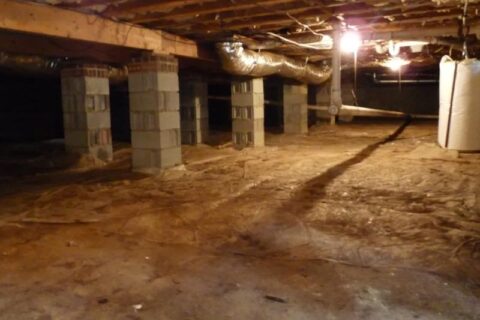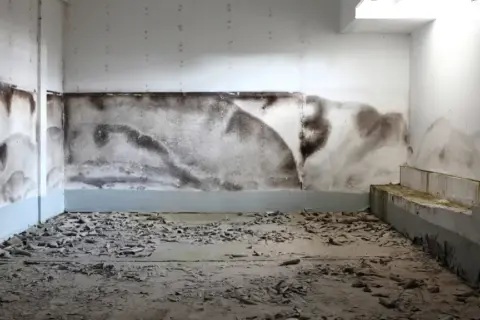Bowing Basement Walls: Understanding the Causes, Risks, and Solutions Evans City, PA
Bowing Basement Walls: Understanding the Causes, Risks, and Solutions Evans City, PA
Bowing basement walls are a common and concerning issue that many homeowners may face. This structural problem occurs when the walls of a basement start to curve or bow inward. The condition not only compromises the integrity of the foundation but also poses significant risks to the overall stability and safety of the entire structure. In this article, we’ll delve into the causes of bowing basement walls, the potential risks associated with this problem, and the various solutions available to address it.

Causes of Bowing Basement Walls
Bowing basement walls are typically a result of external pressure exerted on the foundation, pushing the walls inward. Some common causes of this pressure include:
Hydrostatic Pressure: When the soil surrounding the foundation becomes saturated with water, it creates hydrostatic pressure against the basement walls. The constant pressure can cause the walls to bow inward over time.
Poor Drainage: Improper grading or inadequate drainage systems can lead to water pooling around the foundation. Excess water in the soil can increase hydrostatic pressure and contribute to bowing walls.
Expansive Soil: Certain types of soil, known as expansive soils, have a tendency to absorb water and swell. As the soil expands, it puts pressure on the foundation walls, causing them to bow.
Tree Roots: Large trees located close to the foundation can cause soil to shift and exert pressure on the walls as their roots grow and expand.
Foundation Age and Material: Older foundations or those made from inferior materials may be more susceptible to bowing due to their structural limitations.
Risks of Bowing Basement Walls
Ignoring bowing basement walls can lead to several serious risks, including:
Structural Instability: Bowing walls weaken the foundation, compromising the structural stability of the entire building. This can lead to severe damage to the property and, in extreme cases, even collapse.
Water Intrusion: As the walls bow inward, gaps and cracks form between the wall and the floor, making it easier for water to seep into the basement. This can lead to water damage, mold growth, and deterioration of the building materials.
Decreased Property Value: Bowing basement walls are a significant red flag for potential buyers. If left untreated, the issue can significantly decrease the value of your property and make it challenging to sell in the future.
Health Risks: The presence of water and mold in a damp basement can pose health risks to the occupants, causing respiratory issues and allergies.

Solutions for Bowing Basement Walls
When it comes to addressing bowing basement walls, there are several effective solutions available, depending on the severity of the issue:
Carbon Fiber Straps: Carbon fiber straps are an excellent option for stabilizing bowing walls. These straps are installed on the interior surface of the walls and provide additional support to prevent further inward movement.
Steel I-Beams: Steel I-beams, also known as wall anchors or braces, are installed on the interior or exterior of the walls and anchored to the ground to counteract the pressure and pull the walls back into place.
Helical Tiebacks: Helical tiebacks are used when access to the exterior of the basement walls is possible. These anchors are drilled into the soil to provide lateral support and stabilize the bowing walls.
Waterproofing and Drainage: Implementing proper waterproofing and drainage solutions around the foundation can help reduce hydrostatic pressure and prevent water-related issues that contribute to bowing walls.
Consulting a Professional
Given the complexity and importance of addressing bowing basement walls, it is crucial to consult a professional foundation repair contractor. They can accurately assess the severity of the issue and recommend the most appropriate and effective solution for your specific situation.
Bowing basement walls are a serious concern that should not be ignored. Understanding the causes and risks associated with this problem is essential for protecting the structural integrity and safety of your home. If you notice any signs of bowing walls, such as cracks, inward movement, or water intrusion, don’t hesitate to seek professional help. Timely intervention and the implementation of appropriate solutions can safeguard your home and provide you with peace of mind for the long term.
Contact the Professionals at Everdry Waterproofing of Pittsburgh Today! 724-538-1600


